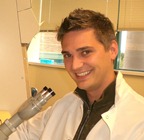May 21, 2012 -- Researchers have been looking for a way to vaccinate against human immunodeficiency virus since shortly after the virus was discovered 30 years ago. A few -- including OHSU immunologist Louis Picker -- have made major strides toward a vaccine formula. But the virus continues to outsmart vaccine prototypes, largely because the onset of AIDS is not caused by a single pathogen. Instead, it's caused by what immunologists call a "swarm" of pathogens.
The advent of antiretroviral drugs in the early 1990s has meant full-blown AIDS can be kept at bay for years. That means that for patients who can access and afford them, the virus that was once a death sentence is now more like a manageable, chronic condition.

But ARTs can be outsmarted too. Treatment "knocks the virus down, but
eventually it becomes pathogenic," OHSU researcher Jonah Sacha, PhD said. "You can sort of think of it like influenza on steroids."
Sacha is the lead researcher on a vaccine project which will target a
specific class of viruses -- called endogenous retroviruses -- triggered by HIV infection. His team has received a $1 million grant from the Bill
and Melinda Gates Foundation, through its Grand Challenges Explorations grant program, for its research.
Endogenous retroviruses, or ERVs, are viruses that have been found in the human genome -- which evolutionary biologists believe have been DNA since humans evolved. Some researchers have found a link between ERVs and other ailments, including some cancers, ALS (also known as Lou Gehrig's Disease) and some autoimmune disorders, particularly multiple sclerosis. Patients with those diseases have been found to have antibodies to some ERVs -- and others can be triggered by HIV infection.
"Ten percent of the human genome is actually viruses," Sacha said, and ERVs are actually critical to the development of the placenta. Others can actually be triggered by HIV infection -- and those are the viruses Sacha and his team intend to develop a vaccine to target.
The grant is for a two-year project, but in the grant application the team said they would ask for a third year. The first phase will be an exploratory phase, screening patients for ERV antibodies, and then developing a vaccine prototype to target the ERVs that flare up in HIV patients.
"The big thing is that we're still not clear if they have a big role," Sacha said. "This grant is sort of very high risk." The vaccine will be tested on rhesus monkeys at the Vaccine and Gene Therapy Institute in Beaverton, since it's unclear whether it would be helpful to human test
subjects or just make them sick, Sacha said.
Sacha has been working in HIV vaccine development since 2003 and working at VGTI since 2007. He said this project has a somewhat unusual hypothesis -- but one well worth trying.
"It's definitely a really wild approach," Sacha said. "We've been working
on HIV vaccines for 30 years and nothing's worked."